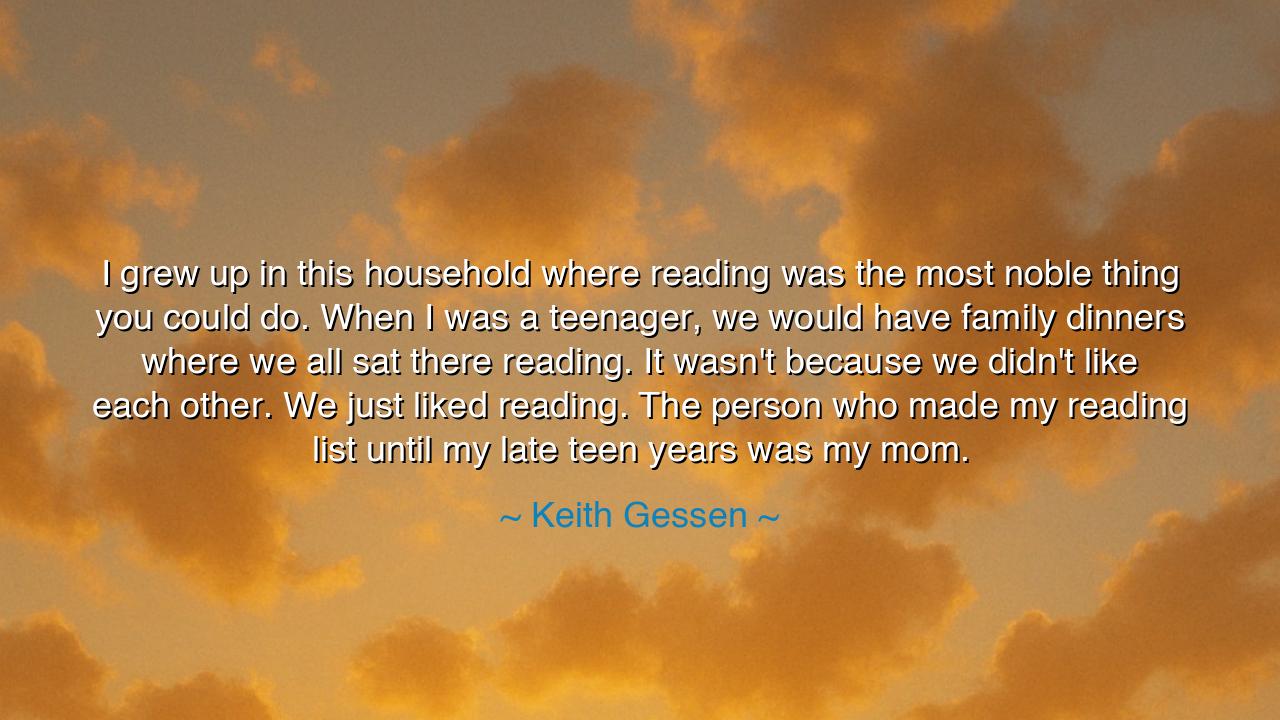
I grew up in this household where reading was the most noble
I grew up in this household where reading was the most noble thing you could do. When I was a teenager, we would have family dinners where we all sat there reading. It wasn't because we didn't like each other. We just liked reading. The person who made my reading list until my late teen years was my mom.






Hear the words of Keith Gessen, who reflected upon the roots of his upbringing, saying: “I grew up in this household where reading was the most noble thing you could do. When I was a teenager, we would have family dinners where we all sat there reading. It wasn’t because we didn’t like each other. We just liked reading. The person who made my reading list until my late teen years was my mom.” In these words, we glimpse not merely a memory of childhood, but a vision of how the soul is shaped by ritual, by discipline, and by love. The table, often a place of chatter and feasting, became in his home a sanctuary of silence, where each voice communed not with gossip, but with the eternal voices of the written word.
To call reading the most noble act is to see it not as pastime, but as pilgrimage. For in every book lies a bridge between minds, between generations, between nations. What Keith describes is no ordinary custom, but a sacred order where wisdom was revered above trivial pursuits, where ideas were shared across centuries by opening the covers of a book. In this way, his family aligned themselves with the sages of old, who believed that the written word was the closest man could come to touching immortality.
Consider the tale of Augustine of Hippo, the great thinker of the early Church. In his Confessions, he describes how he once marveled at Ambrose, who could read silently, his lips unmoving—a practice astonishing to men of that time. To Augustine, such reading was a wonder, an act of deep communion with truth. In the Gessen household, this same reverence lived on: each member absorbed not just stories, but lifeblood for the mind, silently weaving themselves into the fabric of human thought. What others might call unusual, they called natural.
And note the presence of the mother, the one who crafted the path, who curated the texts, who acted as guide and gatekeeper of the mind. It was she who shaped his reading list, not as a tyrant but as a steward of his growth. Her choices, like seeds planted in fertile ground, bore fruit that would last a lifetime. Here we see again the eternal role of parents—not only to feed the body, but to nourish the spirit, not only to guard against harm, but to arm the mind with wisdom. Many mothers have done so in secret, shaping civilizations by the silent act of guiding what their children read.
The lesson of this memory is profound: that family traditions can shape destinies. Where some families exalt wealth, or status, or appearance, Keith’s family exalted words. And thus, in the temple of their household, truth was honored, imagination celebrated, and wisdom pursued. From this soil grew a writer, a thinker, one who would later carry forth the very torch first lit at that dinner table. What the world sees as extraordinary is often only the natural flowering of what was daily cultivated in childhood.
For the reader or listener, let this be a call: create in your home rituals that exalt what is noble. If you would raise children of wisdom, surround them with books. If you would raise children of compassion, surround them with service. Do not imagine that greatness arises by accident; it is planted, nurtured, and tended, often by the quiet choices of parents. Begin with small acts: choose a book to read together, set aside an hour of silence for learning, let the table not only be for food but also for the feast of the mind.
And so, Keith Gessen’s recollection stands as both testimony and teaching. His words remind us that reading is not isolation, but communion—that a family reading together is not cold, but deeply united in purpose. The wisdom passed down by his mother was not merely ink on a page, but the shaping of a soul. Thus, the lesson for all generations: honor the written word, cultivate the mind, and pass down to your children not only bread for the body, but the banquet of books. For in these practices, you plant seeds that will bear fruit beyond your lifetime, into eternity.






AAdministratorAdministrator
Welcome, honored guests. Please leave a comment, we will respond soon